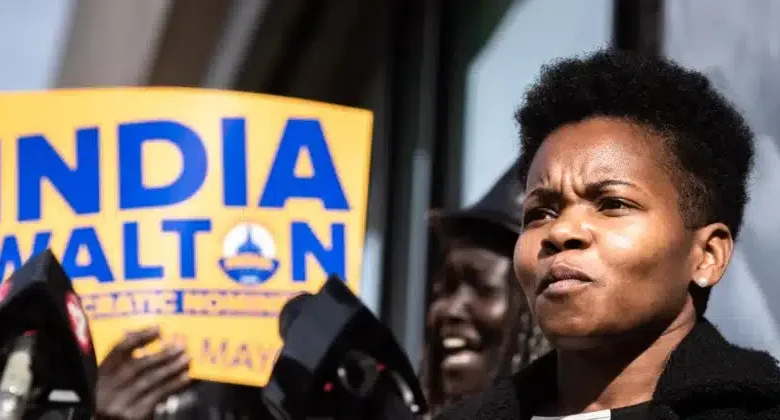Don’t Move to the Center

India Walton says moderating leftist message cost her Buffalo mayoral race, offers lessons for Zohran Mamdani
India Walton has a stark warning for progressive Democrats during Donald Trump’s second presidency: don’t abandon your principles to appease the establishment.
The Democratic socialist who shocked New York politics by defeating four-term Buffalo incumbent mayor Byron Brown in the 2021 Democratic primary believes moderating her leftist message ultimately cost her the general election. Her cautionary tale carries new significance as fellow Democratic socialist Zohran Mamdani prepares for his own general election battle after winning New York City’s Democratic mayoral primary.
The Cost of Compromise
“Moderating is what got us here,” said Walton, now a senior strategist at RootsAction, referring to Trump’s return to the White House. “I believe that moderating is what lost me ultimately the election in 2021.”
After her stunning primary victory over Brown, Walton says she “pivoted fairly quickly” toward the center, attempting to integrate herself into the Democratic Party establishment to build a broader coalition. The strategy backfired.
“It sort of ate away from our message from the inside out,” she reflected.
Walton’s pivot included reversing her opposition to charter schools after initially winning the Buffalo Teachers Federation endorsement by supporting public education. When she later told business leaders she supported “school choice,” the union withdrew its backing for the general election. She also distanced herself from the “defund the police” movement.
Despite these concessions to moderate voters, Brown successfully mounted an unprecedented write-in campaign and defeated Walton in the general election, even as his campaign faced allegations of possible finance violations including contributions from real estate corporations in potential defiance of election law.
Establishment Resistance and Fear
The establishment’s reaction to Walton’s primary win revealed deep institutional resistance to progressive candidates. The city of Buffalo even researched abandoning its mayoral system entirely rather than accept her victory. Brown, an ally of former Governor Andrew Cuomo and former New York Democratic Party chair, received widespread establishment support for his write-in effort.
Governor Kathy Hochul declined to endorse Walton despite her Democratic primary victory, claiming neutrality. State Democratic Party Chair Jay Jacobs went further, infamously comparing the obligation to support Walton to hypothetically endorsing Ku Klux Klan leader David Duke if he won a Democratic primary. The comparison drew swift backlash and Jacobs later issued a public apology.
Lessons for Mamdani and Progressive Movement
Walton sees parallels between her experience and the current situation facing Mamdani, who defeated Andrew Cuomo and others with 56% in New York City’s ranked-choice Democratic primary. Like Walton, Mamdani has yet to receive endorsements from Hochul or state Democratic leadership.
“I think that there are two different sets of rules for two different types of Democrats,” Walton observed. “When it comes to a moderate Democrat, we need to vote blue no matter who. But when it’s a progressive who is fighting for working class people, then everyone has apprehensions.”
Her advice to Mamdani is direct: “Stay the course.” She hopes he can focus on his platform rather than constantly defending his positions or providing “English lessons” about policy terminology to critics.
Progressive Economics vs. Democratic Orthodoxy
Walton argues that Democrats lost working-class voters by abandoning populist economics in favor of establishment priorities. “I think a part of the reason how we got a second Donald Trump presidency is that the Democrats have not had a message that appeals to working-class and poor people.”
She attributes this messaging failure to Democratic leaders being “beholden to corporations and billionaires” rather than ordinary voters.
This analysis contradicts some Democratic strategists who argue the party moved too far left after 2024’s losses. A Progressive Policy Institute survey showed 68% of working-class voters believed Democrats had embraced overly progressive positions.
However, Walton points to contradictory evidence: progressive ballot measures succeeded even as Democratic candidates struggled. Voters in red states like Missouri passed $15 minimum wage increases and paid sick leave, while Nebraska approved guaranteed paid time off. A July 2025 poll by Democratic pollster Celinda Lake found that Democratic voters who skipped 2024 want candidates more like Bernie Sanders and Alexandria Ocasio-Cortez.
Reframing Progressive Messaging
Walton acknowledges that slogans like “defund the police” became political liabilities, but argues the underlying message about shifting police funding toward social services and mental health care was distorted by opponents. The slogan contributed to Democratic losses in swing House districts in 2020, and Minneapolis voters rejected police reform measures even after George Floyd’s murder.
Generational Change and Future Prospects
Walton sees hope in younger voters who “don’t follow traditional political voting patterns,” noting that “Millennials are the first generation who are not becoming more conservative as they age.”
Mamdani’s victory has already generated significant enthusiasm, with the progressive group Run for Something reporting that 10,000 people nationwide signed up to pursue public office within two weeks of his primary win.
Despite her loss, Walton remains uncertain about her own political future, expressing frustration with Buffalo’s political system. “I’m kind of tired of fighting to get in. They don’t want me there. So I have other things to do with my time.”
Democratic Party Leadership Challenge
Walton’s experience highlights ongoing tensions within the Democratic Party between progressive grassroots energy and establishment preferences. Her warning against moderation comes as Democrats grapple with how to rebuild their coalition and compete effectively against Trump’s populist appeal.
For progressives like Mamdani, Walton’s message is clear: “People hear hope in ‘we’re going to prioritize working-class people.’ People hear hope in ‘I’m not going to capitulate to the establishment and negotiate all of our power that we’ve built.’ This is the right time.”
Whether Democratic leadership will embrace this approach or continue resisting progressive candidates may determine the party’s ability to reconnect with workin




